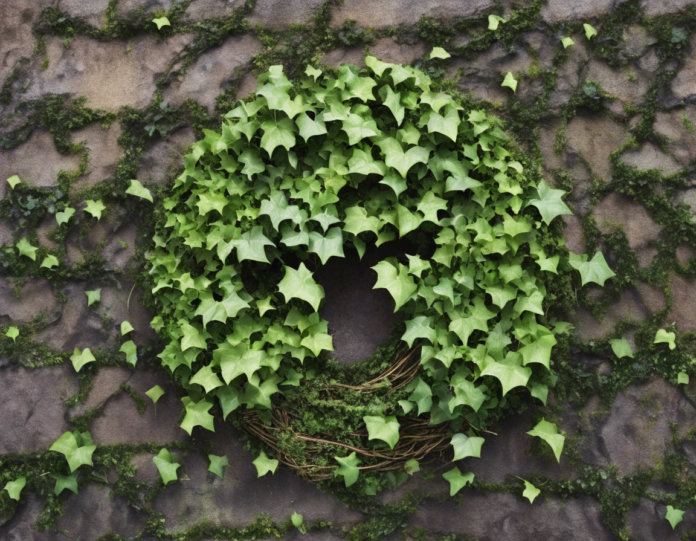Ivy is a timeless, versatile, and charming plant known for its lush green foliage and beautiful trailing vines. It is a favorite among gardeners and interior decorators alike for its ability to add a touch of elegance and natural beauty to any space. From lush outdoor gardens to chic indoor settings, ivy has the power to transform and enhance any environment it graces.
Why Choose Ivy?
Ivy is not just a pretty plant; it offers a wide range of benefits that make it a popular choice for both indoor and outdoor spaces. Here are some reasons why you should consider incorporating ivy into your space:
1. Aesthetic Appeal
Ivy’s lush green leaves and trailing vines add a touch of natural beauty and charm to any space. Whether used as a ground cover, in hanging baskets, or as a climbing plant, ivy can enhance the visual appeal of your home or garden.
2. Air Purification
Ivy plants are known for their air-purifying properties. They can help improve indoor air quality by removing toxins and pollutants, making them a great choice for homes and offices.
3. Versatility
Ivy is a versatile plant that can be grown in various ways. It can be used as a ground cover, in hanging baskets, in vertical gardens, or as a climbing plant. Its flexibility makes it suitable for different types of spaces and design preferences.
4. Low Maintenance
Ivy is a low-maintenance plant that requires minimal care. It is relatively easy to grow and thrives in a wide range of conditions, making it ideal for beginner gardeners or those with busy schedules.
5. Privacy and Shade
When grown as a climbing plant, ivy can provide privacy and shade to outdoor spaces. It can create a natural barrier, screen unsightly views, and block out excess sunlight, making it a practical and aesthetic addition to gardens and outdoor patios.
Types of Ivy Plants
There are various types of ivy plants that you can choose from, each with its unique characteristics and growth habits. Some of the most popular types of ivy include:
- English Ivy (Hedera helix): A classic choice known for its glossy, dark green leaves and fast growth rate.
- Algerian Ivy (Hedera canariensis): Features large, leathery leaves and a more sprawling growth habit.
- Boston Ivy (Parthenocissus tricuspidata): Not a true ivy, but a vigorous climbing vine known for its stunning fall foliage.
- Japanese Ivy (Hedera rhombea): Has crinkled leaves and a more compact growth habit, making it ideal for smaller spaces.
When selecting an ivy plant for your space, consider factors such as growth habit, light requirements, and preferred method of growth (climbing, trailing, etc.).
How to Care for Ivy Plants
While ivy is a low-maintenance plant, it still requires proper care to thrive and look its best. Here are some tips on how to care for your ivy plants:
Light
Ivy plants prefer bright, indirect light. Avoid placing them in direct sunlight, as this can scorch their leaves. If growing ivy indoors, place it near a window where it can receive ample sunlight without being exposed to harsh rays.
Watering
Ivy plants like to have consistently moist soil. Water them when the top inch of soil feels dry to the touch, but be careful not to overwater as this can lead to root rot. Make sure the pots have good drainage to prevent waterlogging.
Pruning
Regular pruning is essential to keep ivy plants looking neat and healthy. Trim back overgrown vines and remove any dead or yellowing leaves to promote new growth. You can also train ivy to grow in a certain direction by pruning it accordingly.
Fertilization
Ivy plants do not require frequent fertilization. Feed them with a balanced liquid fertilizer once a month during the growing season (spring and summer) to support healthy growth. Avoid over-fertilizing, as this can lead to excessive foliage growth with limited root development.
Pest Control
Keep an eye out for common pests that can affect ivy plants, such as spider mites, aphids, and mealybugs. Treat any infestations promptly with neem oil or insecticidal soap to prevent them from spreading.
Temperature and Humidity
Ivy plants prefer moderate temperatures and humidity levels. Avoid exposing them to extreme heat or drafts, as this can stress the plant. Use a humidifier or pebble tray to increase humidity levels if necessary, especially during the winter months when indoor air tends to be drier.
By following these care guidelines, you can ensure that your ivy plants remain healthy, vibrant, and beautiful throughout the year.
Incorporating Ivy Into Your Space
There are countless ways to incorporate ivy into your space, whether indoors or outdoors. Here are some creative ideas to help you make the most of this versatile plant:
Indoor Spaces
- Hanging Baskets: Hang ivy in decorative baskets from ceilings or shelves to add a touch of greenery to any room.
- Vertical Gardens: Create a lush green wall by growing ivy on vertical trellises or in wall-mounted planters.
- Topiaries: Shape ivy into elegant topiaries for a classic and sophisticated look.
- Centerpieces: Use ivy as a base for floral centerpieces or table decorations for a natural touch.
- Terrariums: Plant ivy in glass terrariums for a trendy and low-maintenance indoor garden.
Outdoor Spaces
- Arbors and Pergolas: Train ivy to climb arbors and pergolas for a romantic and enchanting outdoor retreat.
- Fences and Walls: Plant ivy along fences or walls to create a natural privacy screen or green backdrop.
- Ground Cover: Use ivy as a ground cover in shady areas where grass struggles to grow, adding texture and visual interest to the landscape.
- Container Gardens: Grow ivy in containers on patios, balconies, or porches to soften hard surfaces and create a welcoming outdoor oasis.
Whether you choose to grow ivy indoors or outdoors, the possibilities are endless when it comes to incorporating this beautiful plant into your living spaces.
Frequently Asked Questions (FAQs)
1. Is ivy easy to grow?
Yes, ivy is relatively easy to grow and requires minimal maintenance. It thrives in a variety of conditions and is well-suited for both beginner and experienced gardeners.
2. Can ivy be grown indoors?
Yes, ivy can be grown indoors as long as it receives adequate light and moisture. It is a popular choice for adding greenery to homes, offices, and other indoor spaces.
3. Does ivy require a lot of water?
Ivy plants prefer consistently moist soil but should not be overwatered. Allow the top inch of soil to dry out between waterings to prevent root rot.
4. How fast does ivy grow?
The growth rate of ivy plants can vary depending on the species and growing conditions. In general, ivy is a fast-growing plant that can quickly cover walls, trellises, and other structures.
5. Can ivy damage walls or structures?
While ivy can attach itself to surfaces using aerial rootlets, it typically does not cause damage to well-maintained walls or structures. To prevent any potential damage, avoid allowing ivy to grow unchecked or become too dense.
6. Does ivy require support for climbing?
Some ivy species, such as English Ivy, have aerial rootlets that allow them to climb structures on their own. Other types of ivy may require a trellis, wall, or other support for climbing.
7. Is ivy suitable for low-light conditions?
While ivy prefers bright, indirect light, some varieties can tolerate lower light conditions. However, their growth may be slower, and they may not thrive as well as when provided with ample sunlight.
8. Can ivy be propagated easily?
Ivy plants can be propagated easily through stem cuttings. Simply take a cutting from a healthy ivy plant, place it in water or soil, and wait for roots to develop before transplanting it into a new container.
9. Are all types of ivy invasive?
While some ivy species, such as English Ivy, can be invasive in certain regions, not all types of ivy exhibit invasive tendencies. It is essential to research the specific species and local regulations before planting ivy in your area.
10. Can ivy be grown alongside other plants?
Ivy can be grown alongside a variety of other plants, both indoors and outdoors. When planting ivy with other species, consider factors such as light requirements, growth habits, and watering needs to ensure compatibility and harmony in your garden or home.
In conclusion, ivy is a versatile and beautiful plant that can enhance any space with its aesthetic appeal, air-purifying properties, and low-maintenance care requirements. Whether used indoors or outdoors, ivy has the power to transform your living spaces into green oases of natural beauty and tranquility. By selecting the right type of ivy, providing proper care, and incorporating it creatively into your environment, you can enjoy the timeless elegance and charm that this beloved plant brings to your home or garden.

